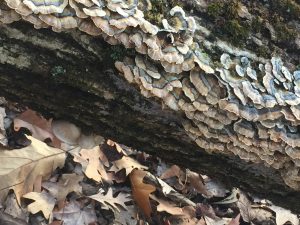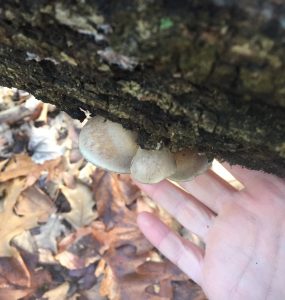Yesterday I was going on a walk through the woods when I cam across a fallen tulip poplar tree. The first thing I noticed about this tree was that was full of turkey tail mushrooms. Upon closer inspection, I realized that there where also oyster mushrooms fruiting out of the same log!

To me, this was absolutely amazing; that there could be such an abundance of edible and medicinal mushrooms growing together on the same log! And what’s more, it required absolutely no effort on my part, or on the part of any human at all!

This got me thinking: If there is such an abundance of food and medicine in the forest, and if that abundance requires no more labor on our part than simply walking through the woods, then why on earth do we work so hard all the time!? Rather than slaving away in the hot, sunny fields, we could be enjoying a leisurely stroll through the shady woods.
Thinking back to a previous lesson from the woods, I though “with just a little bit of effort, I could move some of these fallen logs to create a little fence, and then inside the fence plant a nut tree and perhaps a raspberry cane. In a few years, this spot will be producing a magnificent bounty of nuts, mushrooms, and berries, and there are sure to be various herbs around as well.”
Imagine such a lifestyle: spending only a few hours everyday out in the woods gathering delicious food, then spending the rest of the time playing with your friends and family, cooking around the fire while talking, sharing stories, and playing music.
This may seem like an idealized version of the past, but in fact, it is a hopeful vision for the future.
It is a fact that most hunter gather societies only spent about 3 hours a day gathering food, and even hunter-gatherers living in the harshest, most extreme environments on Earth today have more time for leisure than the average person living in a “wealthy” industrialized nation like the US [94].
It is also a fact that in many of these societies infant mortality rate is higher in hunter-gatherer societies without modern medicine [95].
I am not proposing that we forget everything we know about medicine and technology and “go back” to living in tribal hunter-gather societies. What I am suggesting is that we take the important lessons we have learned from studying both types of societies, apply self-regulation and accept feedback, and use those lessons today to create a better society for tomorrow.
For example, there are over 40 million acres of turf grass in the United States [96]. That’s about the same are of land that we devote to growing wheat, and about half the area used for corn or soybeans [97]. That means grass is the fourth most grown “crop” in the United States! (it is also the single most irrigated crop, but that’s a whole ‘nother story)
Could you imagine if all, even half o one quarter, of that land was used to grow abundant and productive forest gardens?
We could start feeding the country without the use of toxic pesticides or destructive fertilizers.
We could reduce our carbon footprint and sequester enough carbon to keep global warming below the critical 1.5 ºC.
We could provide meaningful and fulfilling lives for people everywhere.
By using factual evidence and the scientific method, permaculture practices can increase the yields of these forest-based systems over what hunter-gatherers could achieve, while still reducing the amount of work required to meet subsistence requirements over the modern industrial lifestyle.
If every town and city decided to reforest the turf-grass areas in the methods of forest gardens, you could work three days a week at your job to cover medical bills and other expenses, and then on your way home or on your new days off, walk through the woods to unwind and get some exercise while you pick up fresh, healthy food for the week.
By rebuilding forest infrastructure, we could live the life of leisure that hunter-gathers lived, but with the advances in modern medicine that industrial society has developed, avoid the high rates of infant mortality that limited hunter-gathers.
The point is that we don’t have to give up modern medicine or television or fluffy pillows and warm blankets to live in a more environmentally friendly society, and we don’t have to work so hard either.
Granted, there is a lot of work to be done. Converting 40 million acres of turf-grass into forest garden is no easy task. But when it’s done life will be so much easier for all of us, and the future will be much more hopeful for our children. One block at a time, we can convert the crumbling, anxious world of today into the resilient, blissful world of tomorrow. And it starts by planting a tree.